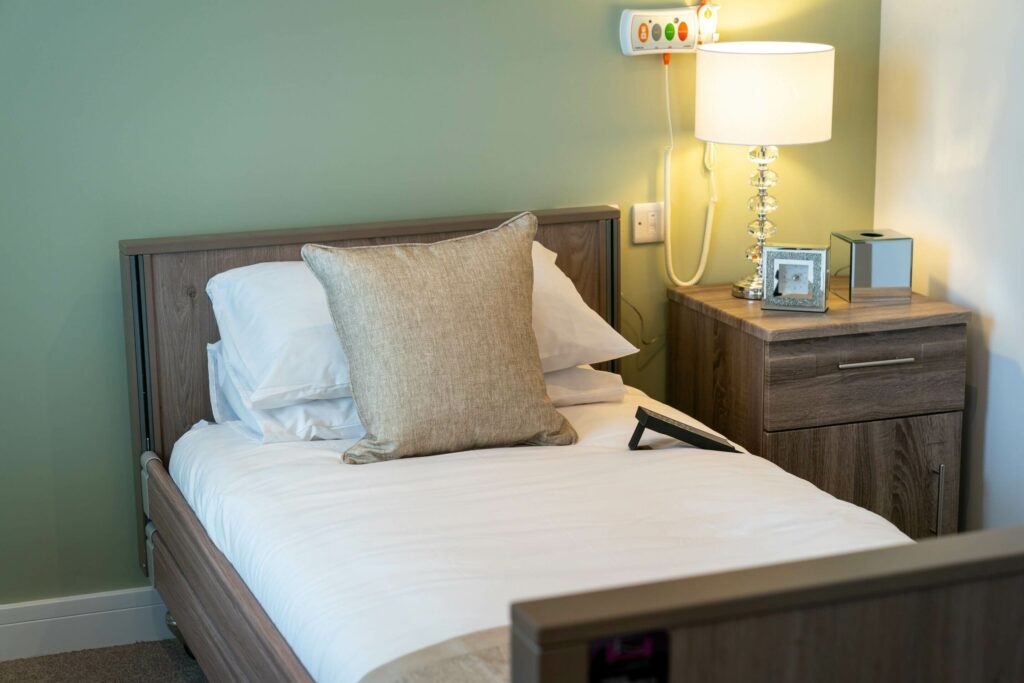How Much Do Care Homes Cost?

Every year, the demand for care homes in the UK sees a significant rise, largely attributed to the growing life expectancy of its population. However, this increased need for care homes is accompanied by an increase in care home costs. With a rise in average care home fees, many families find themselves unsure if a care home is a financially viable choice for themselves or their loved ones.
Within this blog post, we aim to delve deeper into the financial aspects of seeking care in the UK. We will explore the average expenses associated with different types of care homes, whether you opt for a nursing home, a residential care home, or an all-inclusive care home. Furthermore, we will shed light on what you should anticipate as being covered within these care home fees.
We understand that the financial requirements of care homes can be substantial for many families. To provide comprehensive guidance, we will also discuss potential avenues for securing financial assistance and relief. This will encompass various options and resources available to help individuals and families make informed decisions about their or their loved ones' care, ensuring that both their wellbeing and financial stability are considered.
Whether you are a concerned family member or an individual planning for your own future, our goal is to provide you with the knowledge and insights necessary to make well-informed choices regarding care homes and their associated expenses.

How Do Care Home and Nursing Home Fees Vary in Structure?
Care homes and nursing homes adopt distinct fee structures, influenced by a range of factors. One significant factor is the level of care required by the residents. Nursing homes tend to have higher fees compared to care homes, primarily due to the intensive care needed. Activities and facilities within a care home can also impact fees.
While many care homes establish a fixed weekly fee, others opt for a pay-as-you-go approach. Within the standard care home fees, you can anticipate that services like personal care, accommodation, and dining are included. However, additional activities and appointments for services like hairstyling may come at an extra cost to the care seeker.
Understanding Average Care Home Fees in the UK
Carehome.co.uk has provided research on the average costs of care homes across the UK and it offers valuable insights into the average care fees across the country. These fees can vary significantly depending on several factors.
Residential Care Home Fees: For those seeking the most basic type of care in a residential care home, the average fees generally fall within the range of £27,000 to £39,000 per year. This lower-priced option is due to the level and complexity of care provided.
Nursing Home Fees: Transitioning to nursing homes, the cost increases notably. Individuals requiring the specialised care and attention offered in nursing homes can anticipate annual fees ranging from £35,000 to £55,000. This increase in cost is attributed to the higher level of care required in nursing settings.
There are multiple factors that contribute to a care home's weekly costs, making it difficult for individuals and their families to work out how much a care home or a nursing home will cost them.
Location of the Care Home: One of the most influential factors is the geographical location of the care home. Facilities situated in the south of England, particularly in cities like London, tend to be more expensive compared to those in northern regions. The cost of living and demand for care services in these areas can significantly impact the fees charged.
Services & Facilities Included: The services covered in care packages also play a crucial role in fees. Basic care homes may offer personal care, accommodation and dining as part of their standard fee. However, additional services like participating in an activities programme or using some facilities like a hair salon may come at an extra cost. It's essential to carefully review what is included in the fee structure.
Care Requirements: The specific care needs of the individual are another factor that can increase someone's fees. Those with more complex medical conditions, such as dementia or higher levels of personal assistance will likely incur higher fees due to the increased support and resources required.
When considering care home options, it is crucial to take into account the location, the range of services offered and the individual's care needs. By carefully assessing these factors, individuals and families can make informed decisions about the most suitable and financially sustainable care home option for their loved ones.
Costs of Living in a Residential Care Home
Residential care is most suitable for individuals who can maintain their independence for the most part but may need assistance with daily activities of daily living. Choosing to live in a residential care home also provides older individuals with a more relaxed lifestyle without the burden of household responsibilities.
As part of the weekly care expenses, those receiving residential care can anticipate covering the costs of accommodation, meals, and personal care services.
Nursing Care Costs
Nursing care stands as one of the most costly forms of care, primarily because individuals require around-the-clock personal and medical attention. When someone's needs reach a level where they cannot remain in their own home due to the high level of support required and necessitate more intensive medical care than caregivers can provide, a nursing home becomes the most suitable option. Nursing care fees are typically assessed on a weekly basis.
This differs from residential care, as those in need of nursing care require constant 24/7 care and monitoring, which naturally escalates the overall care home expenses. All aspects of care, including accommodation and meals, are encompassed within the cost of care in a nursing home.
Respite Care Costs
Respite care is typically offered on a short-term basis, extending additional support to individuals recovering from hospital stays, managing post-illness recovery or providing a well-deserved respite for their caregivers.
Respite care is structured as short-term support, with payment often arranged on a daily or weekly basis. The care home will assess the individual to ensure they can adequately provide the required support, and the total costs may vary depending on the individual's specific needs.
Dementia Care Costs
Dementia care is specifically tailored for individuals living with dementia, a condition affecting nearly 1 million people in the UK, with expectations of a rising number in the coming years. Due to the specialised nature of this care, which addresses complex needs, it typically incurs higher costs compared to residential care. Care staff must undergo specialised training to address the various stages and symptoms associated with dementia, creating an environment where residents feel safe and comfortable.
What's Covered in the Fees?
The fees associated with care homes can vary significantly depending on the range of services they offer and the unique care requirements of each resident. Typically, care home fees include meals, accommodation and personal care.
However, it's important to understand that care homes may structure their fees differently from one another. Some may provide an all-inclusive package, where all costs and services are bundled into a single fee, while others might charge extra for additional services. Therefore, we recommend reaching out to the home manager to understand the specific care home fees better.

All-Inclusive Care Homes
In recent years, all-inclusive care homes have gained popularity among many individuals. These facilities allow residents to pay a set weekly or monthly fee that covers care, amenities, and additional services. While all-inclusive care homes tend to be pricier compared to traditional care homes, prospective residents often find them appealing. This is because residents can enjoy the benefits of a wide range of services and facilities, ultimately improving their overall quality of life and providing peace of mind.
Considering the ongoing challenges of the rising cost of living in the UK, transitioning to an all-inclusive care home can be a massive advantage for older individuals. It ensures they receive their specific type of care, support, meals, and access to amenities without the constant concerns associated with increasing food prices and utility bills, which can burden those living independently.
When searching for an all-inclusive care home, it's crucial to align the facility with the individual's specific care and wellbeing needs. For instance, if your loved one has advanced dementia, you'll want to ensure that the care home can provide the care to support their high-level needs, as some facilities may only cater to individuals with lower-level dementia.
Covering the Costs of Care
Typically, care home expenses are the responsibility of the person who requires care, often referred to as self-funding. However, not everyone has the financial means to pay for their care independently. Those who cannot afford their care can explore financial assistance options from either their local authority or the NHS, which involves an evaluation of their eligibility through a means test or an assessment done by a medical professional.
Eligibility for Financial Support to Assist with Care Home Fees
Financial support depends on an individual private and state pensions, savings, assets, and specific care needs. The most common avenue for financial aid toward care home costs is to apply for funding from the local council. Their local authority will conduct a financial assessment using a care costs calculator, which is better known as a means test and looks into an individual's savings to see if it falls below a certain threshold.
Financial support depends on the individual
If a care seeker has complex medical needs, this individual may qualify for NHS Continuing Healthcare assistance. To be eligible for NHS-funded nursing care, an assessment is carried out by a multidisciplinary team (MDT). NHS-funded care is not means tested, meaning it does not consider the individual's or their family's income.
If an individual does not meet the criteria for either local authority or NHS funding, they have the option to apply for a deferred payment agreement. This arrangement involves the local authority covering the care home fees initially, with the individual repaying the remaining cost to the local authority once their assets are sold. It's worth noting that interest is often applied to the cost of a deferred payment agreement.
It's important to recognise that financial assistance is not guaranteed for every individual and some care homes may not accept funding support. Before deciding to move into a care home, it's crucial to enquire with the management about their policies on accepting funding. Additionally, undergoing a means test before transitioning to a care home is essential, as it helps determine the level of financial assistance you may be eligible to receive.
Self-Funding Your Own Care
You are classified as a self-funder when you can independently cover the entire cost of your own care. In this situation, individuals are personally responsible for the financial aspects of their care. If their care needs escalate, they may potentially qualify for financial assistance through the NHS.
As previously mentioned, the expenses associated with care home services can vary significantly based on factors such as the type of care home, its location, and the range of care services and amenities provided. Moving into a care home represents a substantial financial commitment, so it's essential to carefully assess the potential cost implications. If you are considering self-funding your care fees, we strongly recommend reaching out to a financial advisor who can evaluate your ability to continue covering all the associated expenses independently.
Local Authority Funding
Local authority funding support is a form of financial aid offered by the local government to individuals who do not have the financial resources to pay for care homes or nursing homes on their own. Eligibility for this support is determined through a means test, which assesses savings, assets, and pension income.
It's important to note that local authority-funded care generally covers basic care home costs, which include accommodation, meals, and essential care services. Any additional services or amenities, such as transportation, social activities, or personal items, may require payment by the individual or a family member, which is often referred to as a top-up fee.
NHS Continuing Healthcare Funding
People with complex or multiple health needs may qualify for NHS-funded care, which covers the entire cost of nursing care in either a care home or a nursing home. It's important to note that NHS continuing healthcare differs from local authority assistance in that it does not require a financial assessment or means test to determine eligibility.
Instead, eligibility for NHS funding is determined through a comprehensive care needs assessment conducted by a multidisciplinary team. This assessment takes into account a person's healthcare requirements, considering factors such as the nature, intensity, complexity, and unpredictability of their condition. Typically, individuals with physical or mental disabilities, terminal illnesses, or severe health conditions often meet the criteria for this type of funding.
The UK's 2025 Cap on Care Fees
The UK government plans to implement a care home fee limit in 2025, ensuring that individuals will not be required to pay more than £86,000 for their care during their stay. Once this limit is reached, the government will assume responsibility for personal care costs. However, it's important to understand that other expenses such as accommodation, meals, and recreational activities are not covered by this limit and must be financed by residents or their families.
In conjunction with the care home fees limit, changes to the upper capital threshold for savings are also scheduled for 2025. These adjustments aim to offer greater clarity and peace of mind regarding care home expenses, providing additional financial support to those who require it.



All-inclusive Living at Our Care Home in Letchworth Garden City
White House Care Home is situated in the charming town of Letchworth Garden City, in the northern part of Hertfordshire. We are proud to offer a newly refurbished care home that upholds high standards in Residential Care, Nursing Care, Dementia Care, Respite Care and Palliative Care. Our recently renovated home has been designed to accommodate up to 50 residents and is equipped with all the modern conveniences necessary for a comfortable living environment.
Our dedicated team is composed of experienced and skilled professionals, all of whom share a common mission; to establish strong relationships with our residents and provide them with exceptional person-centred care and support. Within our home, residents have access to various in-house amenities that enable them to fully enjoy their days, engaging in their favourite hobbies and activities with like-minded individuals.
Find Out More About White House Care Home
If you have any further questions about our all-inclusive care home in Hertfordshire, feel free to contact one of our dedicated team members today by filling out our contact form, by emailing info@whitehousecare.co.uk or by calling 01462 533777.




